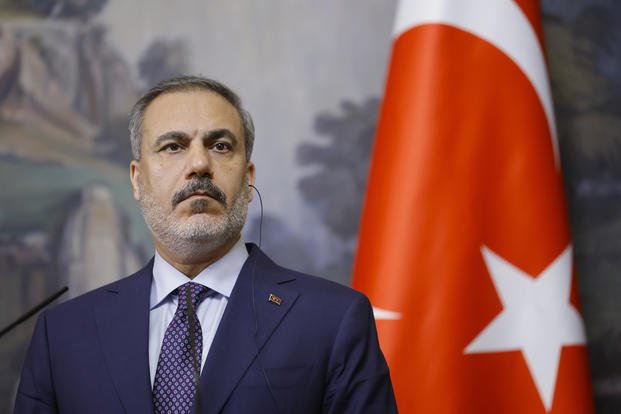
Turkish warplanes have carried out airstrikes on sites believed to be used by a U.S.-backed Kurdish militia in northern Syria, after the U.S. military shot down an armed Turkish drone that came within 500 meters (yards) of American troops, officials said Friday.
A Turkish defense ministry statement said the Turkish jets targeted some 30 sites in the Tal Rifat, Jazeera and Derik regions, destroying caves, bunkers, shelters and warehouses.
Ankara said the locations were used by Kurdistan Workers’ Party, PKK, a designated terrorist group behind a decadeslong insurgency in Turkey — as well as its allies from a Kurdish militia in Syria, known as People’s Defense Units, or YPG.
The YPG is part of Syrian Kurdish-led forces — known as the Syrian Democratic Forces — backed by the United States. The Syrian Kurdish fighters have been close U.S. allies in the war against the militants from the Islamic State group.
Turkey has been carrying out strikes on Kurdish targets in Iraq and Syria following a suicide bombing outside the Interior Ministry building in Ankara, the Turkish capital, early on Sunday.
Turkish Foreign Minister Hakan Fidan has said the two assailants had arrived from Syria, where they had been trained. He said PKK and YPG positions in Iraq and Syria have now become legitimate targets.
Kurdish authorities in northeastern Syria said the Turkish bombing killed 15 people, including eight civilians. Several others were wounded.
The U.S.-backed and Kurdish-led Syrian Democratic Forces in northeastern Syria have denied any connection to the Ankara attack and accused Turkey of using the attack as a pretext for a new military incursion.
In Washington, the Pentagon said Thursday that a Turkish drone bombed targets near the U.S. troops in Syria, forcing them to go to bunkers for safety. Air Force Brig. Gen. Patrick Ryder, the Pentagon press secretary, said the decision to shoot down the drone of a NATO ally “was made out of due diligence and the inherent right of self-defense to take appropriate action to protect U.S. forces.” There was no indication that Turkey was intentionally targeting U.S. forces, he said.
Turkey’s Foreign Ministry on Friday blamed the downing of the drone on differing evaluations of what it called a “deconflicting mechanism” operated between the sides. Necessary measures were being taken to ensure a “more effective operation” of the mechanism, the ministry said without elaborating.
“The incident did in no way affect the execution of the ongoing operation and the strikes against targets that were identified,” the ministry said.
Both Defense Secretary Lloyd Austin and the new Joint Chiefs chairman, Gen. CQ Brown, spoke with their Turkish counterparts quickly after the incident to emphasize the value they place on their relationship with Turkey — but also the need to avoid any similar incidents in the future and ensure the safety of U.S. personnel.





